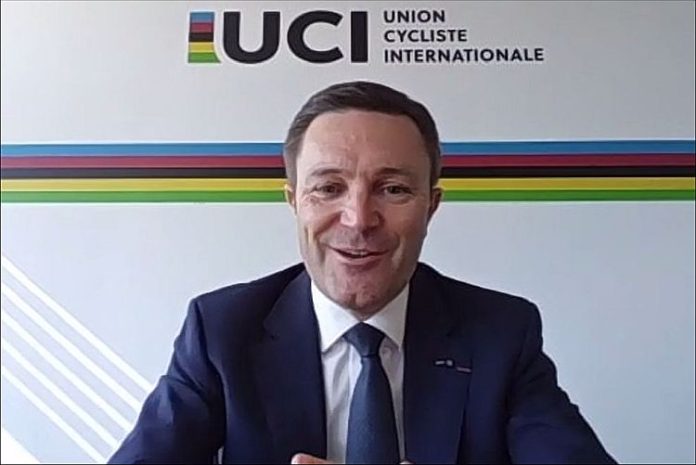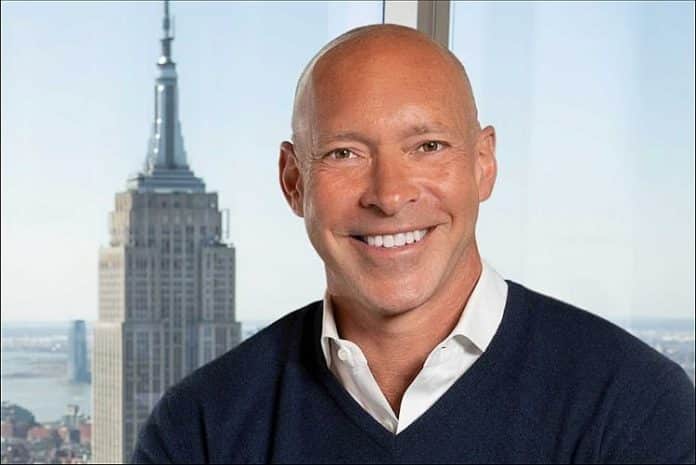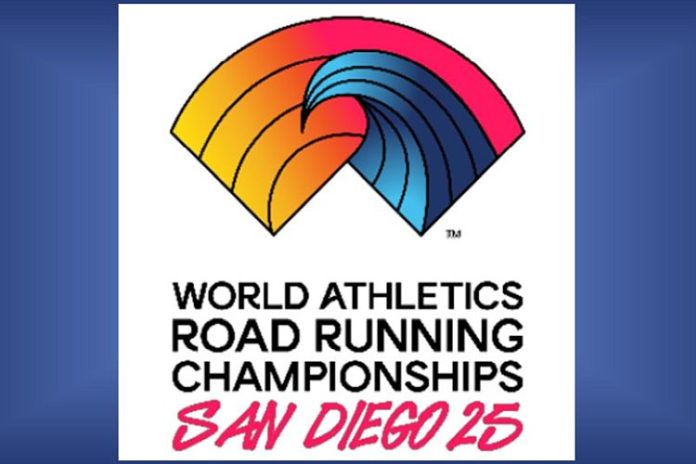★ The Sports Examiner: Chronicling the key competitive, economic and political forces shaping elite sport and the Olympic Movement.★
★ To get the daily Sports Examiner Recap by e-mail: sign up here! ★
≡ IOC PRESIDENTIAL ELECTION ≡
Enjoying the success of the 2024 Olympic Games in Paris last year, David Lappartient didn’t need another job.
He is already the head of the Union Cycliste Internationale and the National Olympic Committee of France (CNOSF), a key player in the award of the 2030 Olympic Winter Games to the French Alps, not to mention the President of the Morbihan region in northwest France.
But when International Olympic Committee chief Thomas Bach (GER) told the IOC Session at the close of the 2024 Olympic Games that he would not accept an extension of his term as President, Lappartient had a decision to make:
“Then I was starting to consider if, or not, I will run. So I took this time, in between the end of the Olympic Games and the 15th of September to discuss with members to see if my candidature would be well received, or not, and I reached the conclusion that, yes, this candidature could be well received and so I took my decision at the beginning of September.”
Lappartient met with Bach about the possibility of running, and was also impressed with Bach’s comments at the IOC Session that the digital world is the key to the future. Well, Lappartient was Bach’s liaison to the e-sports community and had done some impressive work in laying the foundation of the Olympic Esports Games, now to be inaugurated in 2027. So:
“The profile he gave on the potential future IOC President, I don’t think I’m so far away from the profile he gave. That’s why it was, in fact, an invitation for me to think whether or not I will run and I decided to answer yes.”
Asked then about esports and its relationship to the Olympic Movement, Lappartient talked about the parallels:
“We have a kind of mission at the IOC, from the beginning, to bring people together through sports, and to bring them in a peaceful way. So, esports can also be a tool to bring people together. Look at today: the new generation, they are gamers, they are playing together.
“I think this is, in a way, another tool – not far away from the first one – that can also give the opportunity to achieve our goals. This is why I am in favor of esports, also because, yes, the goal is how we can bring gamers to also do sports, how we can – yes – even reach a wider audience, how we can renew the audience of the Olympic Games, and I think it’s a great opportunity for the IOC itself, but in a more separate Games, not within the Olympic Games.”
During his hour-long session of questions-and-answers in a forum organized by the International Sports Journalists Association (AIPS), the question of what to do about athletes from countries at war was raised and Lappartient maintained the position that athletes should not be discriminated against on the basis of their passport. So:
“We call for peace. Of course, we are not naive enough to think our voice is going to stop the war, but we call for peace, we pray for peace and we hope that peace can come back. This is clearly our DNA.
“Sport, and this is key, sport is not a tool for sanction. Sport is a tool to bring people together, so we are not a tool, among others, for sanctions like the United Nations can have. So we have to be careful to stay politically neutral, but also to keep our autonomy.”
As for 2026, he explained, “It’s a little bit too early to take a decision regarding the participation in the Milano Cortina Games. There was a decision [for neutral athletes] that has been taken for the Paris Games and also well supported, in fact, more respected by the French Government, President [Emmanuel] Macron, with the autonomy of the sport.”
With some new activity around negotiations with Russian and Ukraine, Lappartient hoped that the war will stop and that Russia can be “re-integrated” in the right way as a country competing in international competition:
“I do believe that the country is not suspended for life. We hope that the conditions will be back as soon as possible to bring everybody back together. This is our desire.”
Lappartient also emphasized the importance of national teams. Asked about whether club teams – as in cycling – might be a better fit to eliminate the question of Russian participation, he was clear:
“The DNA of the Olympic Games is a competition between nations. And, also, this is why everybody is behind the Games, this is why also the athletes, they are so proud to wear the national jersey, the national flag.
“I will just take an example. Look at [Novak] Djokovic in tennis, in Paris. So he was playing for his country, Serbia, with no prize money and he was crying like a kid, in fact [after winning]. And it was so emotional, even for us.
“So I think this is something unique for the Games. And I think it will touch on this, it is clearly part of the success of the Games.”
He added that the issue of national teams also came up in discussions on esports: “Even gamers, they want to reproduce the Games, and I think one of the big value of the Olympic Games is that it is per nation. I don’t want to touch this, this is one of the fundamental point of the Games.”
On other issues:
● Anti-doping, an especially sensitive subject for Lappartient, given the long and ugly history with doping in cycling:
“It takes five minutes to lose your credibility, but it takes 20-30-40 years to regain your credibility. I know that. …
“This is a daily fight. … And I also believe that the budget that is allocated to the World Anti-Doping Agency, is not big enough to face the challenges we have. We don’t spend, and this is something I mentioned in the [WADA] Foundation Board, I think we don’t spend enough money in research. …
“We know the tension now between USADA and also the White House and the anti-doping agency. If I am elected President, I want to solve this issue. Of course, I am a member of the WADA Foundation Board, so I know very well WADA and they are going a great job.
“But I also know USADA, and have a good relationship with [CEO] Travis Tygart. And I think we have the same goal. It’s just to catch cheaters. And so, how we can work together to do this, how we can even reinforce, because one of the solutions is to reinforce the fight against doping.
“The [increased] contribution is one of the points, to be more down-to-earth sometimes is another point and really, we need to work together, also with Interpol, with the police. … The fight against doping, it has no price, but it has a cost.”
● Universality and making sport more accessible worldwide:
“We need more technology, we need more resources. And if we don’t take care, I think we will not enlarge, but reduce the number of countries able to win medals. And universality is key, but not just the universality to take part, universality also to get medals.
“How we can reach this goal, which is key, I think, for the Olympic Movement? It’s by giving the athletes the same opportunities, whether they are coming from countries with solid expertise – and there are many – but also from countries where they don’t have this expertise, whether they don’t have the equipment, or they don’t have the coaches, because it’s a high level of techniques and so on.
“We have here in the UCI, the World Cycling Centre and we have some satellites. … We have 11 satellites in the world, where we can directly train athletes and then the best ones can reach the World Cycling Centre here in Switzerland and we qualify 11 athletes through this system at the last Olympic Games.”
He suggested that regional training centers could be established through the Olympic Solidarity program, using the success of the World Cycling Centre as a template to support athletes from smaller countries to reach their potential.
● Selecting host cities for the Games:
Lappartient explained that the current system of open dialogue and then targeted dialogue was the product of a broken system in which “there were some behaviors of that time that were inappropriate and that even affected the institution of the IOC and a reduction of the number of candidates. So, we are no more in such a situation.”
He sees a future selection process with the possibility of multiple candidates in targeted dialogue and then a decision by the Session between two or three quality candidates who had been carefully reviewed.
¶
Lappartient was finally asked about what he will do with all of his offices if he is elected as the head of the IOC, including his leadership of the Morbihan region:
“I will also stop this one. To be clear, that’s a 100%-focus position, so if I am elected IOC President, there are two reasons why I will be 100% focused, is because you need to have 100% of your time just for this mission. And a second point, you need to avoid any kind of conflict of interest or any kind of situation where you can take a position that can escape from the political neutrality of the IOC.”
If elected, he will resign from all of his offices in June, ahead of the new IOC President’s term that will begin on 24 June 2025.
Observed: Lappartient, 51, is the second-youngest candidate for the IOC Presidency and he effuses enthusiasm as well as experience. His candidate statement was carefully thought out and offered new ideas, such as the IOC-sponsored regional training centers, based on his successes with the UCI.
It is worthwhile to note that his experience with the UCI and the French National Olympic Committee gives him a breadth of understanding that is only shared by one other candidate, Britain’s Sebastian Coe, who has led the British Olympic Association and is the head of World Athletics.
Lappartient is personable, competent and is reported to be generally well-liked and well-respected, especially for juggling all of his responsibilities, including as a government official.
There are good reasons to vote for him, but will he be overshadowed by Coe’s powerful personality, or the preference of Bach for Zimbabwe’s Kirsty Coventry, or that Lappartient joined the IOC only in 2022, vs. Juan Antonio Samaranch’s 24 years as a member?
That’s what he’s campaigning against, with just a couple of weeks remaining until the decision on 20 March in Greece.
¶
★ Receive our exclusive, weekday TSX Recap by e-mail by clicking here.
★ Sign up a friend to receive the TSX Recap by clicking here.
★ Please consider a donation here to keep this site going.
For our updated, 895-event International Sports Calendar for 2025 and beyond, by date and by sport, click here!























